Abacus Election Bulletin: Top Issues and Our Vote-what motivates us the most?
September 1, 2021
Each day during the 2021 Federal Election campaign, researchers at Abacus Data will share insights and analysis from our polling in concise, insights-focused reports. To never miss our polls and analysis, subscribe to our newsletter.
There are a lot of things that can impact our vote from party leader’s personalities, to how they respond to current events, and the policies outlined in their platform. And that calculation can continue to change in the next two weeks. That said, after taking a deep dive into the issues voters care about, I was curious what exactly voters are looking at when they evaluate a party’s pitch about a particular issue.
To begin, we asked respondents the question, Thinking about those issues that will impact your vote, how important are each of the following when deciding which party to vote for? The total should add up to 100%.
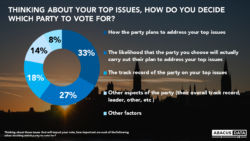
Among the factors listed, how a party’s platform addresses the issue is by far the most important factor. When considering their top issues, the party’s plan on said issue accounts for about a third of calculation. It’s likely that this isn’t just the actual policies itself, but how a combination of how the plan presented (platform à la Conservatives and NDP vs. announcements à la Liberals until this week), how they communicate the plan (the objectives, who it will help), and what specific policies will be part of the plan.
Almost nearly as important as the plan itself, is the likelihood that it will be executed. Whether they believe the party will actually carry out said plan, accounts for about a quarter of the calculation for the average Canadian.
A party’s track record is the third most important factor- but notably a smaller part of our calculus than the plan and execution. This may be good news for party leaders who are going through their first federal election as leader-and don’t have as much of a record to show. But could also be good news for incumbents who might not have a track record worth sharing.
What this does mean is that when looking at issues, we care more about what a party says they will do in the future, rather than what they have done in the past. I dig into the results for the top three issues below.
COST OF LIVING AND VOTE DECISION
Looking at what issues we think are important, the calculation doesn’t change much.
For those who places cost of living in their top two issues, the party’s plan and the trust we have in a party to carry out their proposed plan are still most important for these voters.
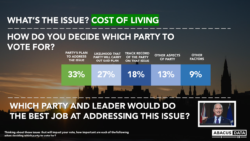
And who do these voters think does this best? Right now it’s Erin O’Toole and the Conservatives.
So, what does this say about Mr. O’Toole and his party? Based on how these voters make up their minds, it seems like cost of living voters believe the Conservative’s plan to address cost of living will be the best, and they also likely believe Mr. O’Toole is the most likely to follow through on his plan.
HEALTHCARE AND VOTE DECISION
Voters who consider healthcare as one of their top two issues are also fairly similar to the average Canadian. The party plan, and the likelihood the party will execute the plan are also the most important.
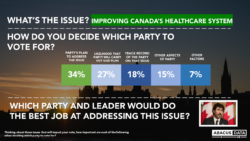
And right now, the party who seems to be presenting the best plan, and seems most likely to execute is Justin Trudeau and the Liberals.
CLIMATE CHANGE AND VOTE DECISION
We see a similar trend with climate change and the environment as well (rounding out the top 3 issues for Canadians). The plan and predicted follow-through are also most important. And for these voters, the majority think Trudeau does it best.
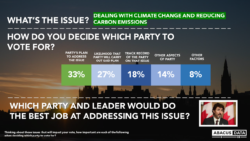
THE UPSHOT
According to Oksana Kishchuk:
At two weeks in there are still many things that could impact our vote beyond the top issues of this election- events unfolding in Afghanistan, a wave of Covid cases, performance at the debates… etc. But, if the election is decided on our top issues, it will be about who has the best plan to address these issues, and who is most likely to execute on what they promised.
These two factors are by far the most important when Canadians are looking at how their top issues will impact their vote- preferring a focus on what parties promise for the future rather than what they have done in the past.
METHODOLOGY
Our survey was conducted online with 2000 Canadians aged 18 and over from August 24 to 29, 2021. A random sample of panellists was invited to complete the survey from a set of partner panels based on the Lucid exchange platform. These partners are double opt-in survey panels, blended to manage out potential skews in the data from a single source.
The margin of error for a comparable probability-based random sample of the same size is +/- 2.2%, 19 times out of 20. In Canada the data were weighted according to census data to ensure that the sample matched Canada’s population according to age, gender, educational attainment, and region.
The survey was paid for by Abacus Data Inc.
Abacus Data follows the CRIC Public Opinion Research Standards and Disclosure Requirements that can be found here: https://
ABOUT ABACUS DATA
We are the only research and strategy firm that helps organizations respond to the disruptive risks and opportunities in a world where demographics and technology are changing more quickly than ever.
Find out more about what we are doing to help clients respond to the COVID-19 pandemic.
We are an innovative, fast-growing public opinion and marketing research consultancy. We use the latest technology, sound science, and deep experience to generate top-flight research-based advice to our clients. We offer global research capacity with a strong focus on customer service, attention to detail and exceptional value.
We were one of the most accurate pollsters conducting research during the 2019 Canadian Election.
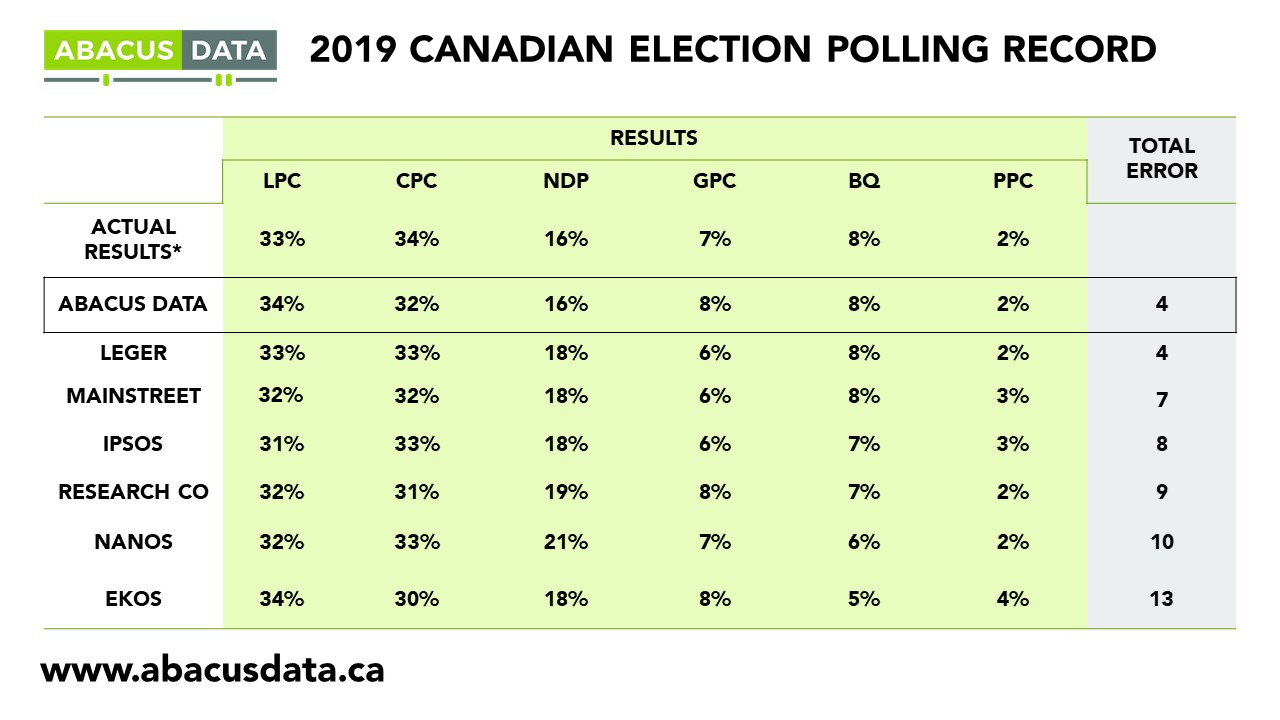
Contact us with any questions.
Find out more about how we can help your organization by downloading our corporate profile and service offering.



